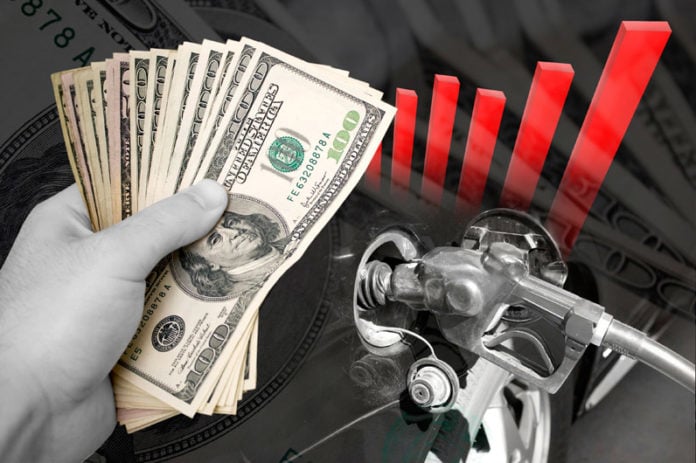If you have been to the gas pump recently to fuel up your vehicle, you probably noticed that the gas prices keep rising and it is becoming more and more expensive to fill up the full tank.
As the price of crude oil is rising it is not a surprise that gas prices increase as well.
However, the cost of crude oil is only one of the reasons why gas prices are so high.
Related: Top 8 Uses of Natural Gas
How Gas Prices are Calculated?
Let’s take a closer look at how gas prices are calculated.
There are four main components that when added together make up the price of gasoline that you are seeing at the gas pump.
To illustrate how those 4 components affect the gas prices we will use the current gas price ($1.87/L) in the city of Vancouver, British Columbia which has some of the highest gas prices in Canada.
1. Price of Crude Oil
That’s the cost of crude oil which is used to make gasoline.
As the price of crude oil increases so does the price of gasoline.
Crude oil costs make up around 44% of the price of gasoline.
So in our example, you are paying $0.82/litter to cover the cost of crude oil.
What factors affect the price of crude oil?
- The Production Costs – the costs to get oil out of the ground
- The Transportation Costs – the cost to get oil from the field to the refinery
- The Type of Oil – lighter oils like WTI and Brent are more expensive because you can make more gasoline from them than from heavier crude oil
- Demand – how much oil is being used
- Supply – how much oil is available. Conflicts in oil-producing countries can significantly decrease the supply. OPEC can also affect the supply of crude oil.
- Market Speculations – fears and rumors can drive the price of oil
Currently one of the reasons why oil is hitting almost $130 per barrel is the conflict between Russia and Ukraine.
Russia is supplying a lot of oil and gas to Europe and there is a high potential that this supply will be interrupted and that’s why prices are currently spiking and may increase even higher.
This means the gasoline prices that we are seeing at the pump will likely continue to rise in the near future.
Related: 6 Main Factors That Affect Oil Prices
2. Refining Costs
To convert crude oil into gasoline that you can use in your car it needs to be refined.
The costs associated with converting crude oil into gasoline are called refining costs.
In addition, the refinery needs to make some profit to stay afloat and that’s why they charge more than it costs for them to make gasoline.
Refinery costs are about $0.47/Liter or 25% of the price of gasoline.
3. Taxes
As with everything else, gasoline is taxed as well and different countries and regions have their own taxes.
Vancouver is a good example because it has almost 6 different taxes for gasoline.
- Provincial motor fuel tax – 1.75 cents
- Carbon tax – 9.96 cents. Carbon tax tends to increase each year and this also increases the amount you pay at the pump.
- Dedicated Motor Fuel Tax (BCTFA) — 6.75 cents
- TransLink tax – 18.5 cents
- Federal excise tax – 10 cents
- Goods and Services Tax (GST) – 5%
All these taxes add up to $0.55/liter or almost 30% of the price of gasoline.
As you can see taxes have a significant effect on the price of gasoline.
4. Retail Costs
Retail costs are what gas stations are making from selling gasoline.
In our example, it is just $0.03/liter but in most cases, it will be slightly higher than that.
If we add up the cost of crude, refining costs, taxes, and retail costs the total price is $1.87/liter ($0.82+$0.47+$0.55+$0.03)
Even though we are talking about the prices of gasoline very similar logic applies to the price of diesel as well.
Read next: What is Crude Oil Made Of?
References:
www2.gov.bc.ca/assets/gov/taxes/sales-taxes/publications/mft-ct-005-tax-rates-fuels.pdf
charting.kalibrate.com/Charting/Margins
